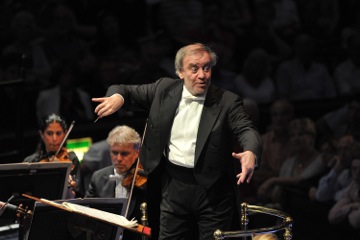 United Kingdom PROM 4: R. Panufnik, R. Strauss, Mahler World Orchestra for Peace, Valery Gergiev (conductor). Royal Albert Hall, London, 20.07.2014 (CC)
United Kingdom PROM 4: R. Panufnik, R. Strauss, Mahler World Orchestra for Peace, Valery Gergiev (conductor). Royal Albert Hall, London, 20.07.2014 (CC)

R. Panufnik – Three Paths to Peace (European Première)
R. Strauss – Die Frau ohne Schatten: Symphonic Fantasia
Mahler – Symphony No. 6
It was fascinating to encounter the World Orchestra for Peace, formed by Sir Georg Solti in 1995. Gergiev has been intensely linked to the ensemble, directing each of the appearances since then. Members of a huge range of international groups come together in the highest cause of all – peace. Each piece featured a different leader: Julia Becker (Tonhalle Orchestra, Zurich), Eric Lacrouts (Orchestre de l’Opéra de Paris) and Lorenz Nasturica-Herschcowici (Munich Philharmonic Orchestra).
Roxanna Panufnilk’s Three Paths to Peace (2008) takes the story of Abraham and Isaac, a tale found in a variety of religions, including Islam, Christianity and Judaism. The piece included lots of references from these three faiths: Church bells, plainsong, the Islamic call to prayer – the very opening – shofar calls and traditional prayer from Judaism and church bells and plainsong from Christianity. There is plenty of scope here for depth, then: the idea of commonalities between the various streams of religious thought, indeed claims that they all stem from the same source, is not new, but there is the potential to tap into something spiritual that is greater than any individual religion. That depth was sadly not reflected in Panufnik’s writing.
The very egalitarianism behind Panufnik’s piece perhaps reflects the orchestra’s priorities of peace, and it is expertly written. The concept is stimulating, and the realisation expert both in terms of Panufnik’s sensitive scoring and Gergiev’s realisation. Soloists from the orchestra were uniformly excellent. But it was perhaps a reflection of the rather meandering, pleasant demeanour of Three Paths to Peace that the audience seemed particularly restless.
There are five parts: ‘The Calling’; ‘The Journey’; ‘The Sacrifice’; ‘The Angel Appears’ and ‘Three Paths to Love’, totalling about twelve minutes of music. Plainchant, in the composer’s own words, “goes off the rails” in ‘The Sacrifice’. The piece ends on a “high note of hope” (again, Panufnik on herself) with “an A, for Abraham”. There was the niggling doubt throughout that the massive talent of this glorious pool of players could have been put to better use.
The Strauss brought the concert to a new and different plain, however. The true calibre of the players shone in the heavy brass of the opening and the glowing strings of this twenty-minute précis of Die Frau ohne Schatten. Perhaps most impressive was the wonderful deftness of some characteristically light, even gossamer, Straussian writing. Antiphonal violins and six double-basses lent a rich, almost burnished sound. Under Gergiev textures were lush but not occluded. Melodies held the perfect level of Romantic sweep, and climaxes were finely moulded (especially moments when the sound became organ-drenched ). It was a shame the superbly balanced final, quiet chord was followed by a minimal amount of silence: the Proms Express strikes again.
Mahler’s Sixth Symphony is no stranger to the Proms, attracting such luminaries as Barbirolli, Boulez, Haitink, Tennstedt, and (if memory serves, as it is not mentioned in David Gutman’s list in “previously at the Proms”) Sinopoli. Taking of Proms Expresses, Gergiev opted not to wait for anything resembling silence from the audience before launching into the tramping opening. Occasional ensemble problems, pizzicati lost in the acoustic, cowbells lost somewhere around Knightsbridge station by the sounds of it and the occasional downplaying of significant moments were balanced out by the distinctly nightmarish opening to the development and the extremely clear lines throughout, even at the higher dynamics. Yet Gergiev has a habit of steaming his way through climaxes. I remain unsure that the immediate shout of “yee-haw” from one over-enthusiastic Prommer at the end of the first movement was justified.
Gergiev opted to place the slow movement second – to those of us weaned on hearing the Scherzo second, this always seems strange. It was a properly paced Andante full of delights such as creamy cor anglais with stunningly beautiful woodwind support and a perfect horn solo, but again Gergiev carved his way relentlessly through some passages in a weirdly no-nonsense fashion that did not seem to stem from any purposefully deconstructionist aesthetic.
Perhaps learning his lesson, there was no break before the Scherzo itself, which was rustic and with some lovely pecking staccato. It was a shame that the acciaccaturas in the horns sounded contrived rather than brazen. It was, in fact, the finale that was the triumph of the performance. Hammer blows of immense force – a visual treat, too, with an almost impossibly large hammer in use and a huge cloud of dust in the wake of the first strike – marked major structural junctures, and the whole, vast movement was presented tautly, with no sense of sagging. This is surely the most difficult movement, interpretatively speaking, and Gergiev’s was one of the finest accounts I have heard. If the final impression was not that one had heard a piece that contains a summary of the emotions of the World, there was still much here to celebrate.
Colin Clarke
